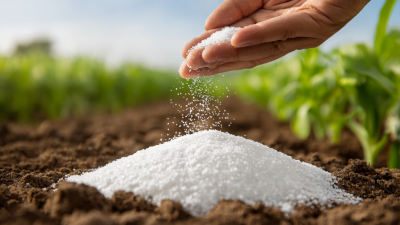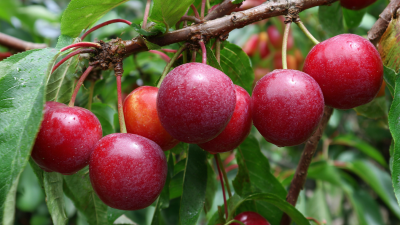 The increasing demand for sustainable agricultural practices has led to the exploration of innovative approaches to boost crop yield without compromising environmental integrity. Water Soluble Organic Nitrogen Fertilizer has emerged as a crucial component in this transformation, offering a balanced solution for nutrient delivery. According to a report by the Food and Agriculture Organization (FAO), the global fertilizer market was valued at approximately $200 billion in 2021, with organic fertilizers witnessing a significant growth rate of around 11.1% annually. This surge in interest is fueled by the recognition that conventional fertilizers often result in soil degradation and water contamination. In contrast, Water Soluble Organic Nitrogen Fertilizer not only provides essential nutrients to crops but also improves soil health and promotes biodiversity. By leveraging this innovative fertilizer, farmers can enhance productivity while aligning with sustainable farming practices, addressing both economic and environmental challenges in agriculture.
The increasing demand for sustainable agricultural practices has led to the exploration of innovative approaches to boost crop yield without compromising environmental integrity. Water Soluble Organic Nitrogen Fertilizer has emerged as a crucial component in this transformation, offering a balanced solution for nutrient delivery. According to a report by the Food and Agriculture Organization (FAO), the global fertilizer market was valued at approximately $200 billion in 2021, with organic fertilizers witnessing a significant growth rate of around 11.1% annually. This surge in interest is fueled by the recognition that conventional fertilizers often result in soil degradation and water contamination. In contrast, Water Soluble Organic Nitrogen Fertilizer not only provides essential nutrients to crops but also improves soil health and promotes biodiversity. By leveraging this innovative fertilizer, farmers can enhance productivity while aligning with sustainable farming practices, addressing both economic and environmental challenges in agriculture.
Water soluble organic nitrogen fertilizers play a vital role in sustainable agriculture by providing essential nutrients efficiently and promoting soil health. These fertilizers are designed to dissolve in water, making them readily available for crop absorption, thus minimizing nutrient loss and ensuring that plants receive the necessary elements for optimal growth. The recent interest in organic fertilizers reflects a growing understanding of their benefits, including improved soil structure and increased nitrogen sequestration. With advancements like vermicompost application demonstrating favorable impacts on soil characteristics, it is evident that integrating organic approaches can lead to enhanced agricultural productivity.
Moreover, the evolving organic fertilizers market is driven by government incentives and innovative technologies aimed at promoting sustainable farming practices. Companies are investing in developing new formulations, such as those that incorporate biochar and biopolymers to create slow-release fertilizers, which can help maintain soil moisture and nutrient availability. As consumer demand for environmentally friendly farming solutions continues to rise, the expansion of the water-soluble fertilizer sector is expected to significantly contribute to sustainable farming efforts globally.
Water soluble organic nitrogen fertilizers are increasingly recognized for their substantial benefits in enhancing crop yield and promoting soil health. As sustainable farming practices gain traction, these fertilizers offer an efficient nutrient delivery system that enables crops to absorb nitrogen quickly and effectively. This is particularly important in a world where the demand for food production is continually rising, putting pressure on farmers to optimize their yield without compromising the environment.
One key advantage of using water soluble organic nitrogen is its ability to improve soil structure and microbial activity. When applied, these fertilizers not only provide essential nutrients but also enhance the organic matter content of the soil, creating a more hospitable environment for beneficial microorganisms. This leads to healthier plants and ultimately higher crop yields, proving that sustainable farming practices can go hand-in-hand with economic viability.
**Tips:** To maximize the benefits of water soluble organic nitrogen fertilizers, consider applying them during critical growth stages of your crops. Ensure even distribution to prevent nutrient leaching. Additionally, monitor soil moisture levels, as these fertilizers are most effective when the soil is adequately hydrated.

Water soluble organic nitrogen fertilizers offer a powerful solution for enhancing crop growth and improving soil health in sustainable farming practices. Effective application techniques vary significantly depending on the farming system in use. For instance, in conventional row cropping, it is essential to integrate the fertilizer during the planting phase to ensure that plants can access the nutrients as they develop. This technique maximizes nutrient uptake and minimizes leaching, which is crucial for preserving soil integrity.
In contrast, in organic or permaculture systems, farmers might benefit from foliar sprays of water soluble organic nitrogen. This method allows for quick absorption through plant leaves, providing an immediate boost of nutrients during critical growth stages. Additionally, incorporating these fertilizers through drip irrigation systems can enhance efficiency, delivering consistent nourishment directly to the root zone while reducing wastage. Adjusting application techniques to the specific needs of the farming system can significantly enhance productivity and contribute to more sustainable agricultural practices.
This chart illustrates the effectiveness of water soluble organic nitrogen fertilizer in various farming systems, showcasing the percentage yield increase in crops such as corn, tomatoes, and wheat when applied using different techniques.
Water-soluble organic nitrogen fertilizers offer distinct advantages over traditional fertilizers, particularly in terms of immediate plant availability and reduced environmental impact. Unlike conventional fertilizers, which often rely on synthetic compounds, water-soluble organic options are derived from natural sources, providing nitrogen in a form that is readily assimilated by plants. This immediacy can enhance crop yield and quality, as plants can more efficiently utilize the nutrients during critical growth stages.
Moreover, water-soluble organic nitrogen fertilizers contribute to sustainable farming practices by minimizing nutrient runoff and soil degradation. Traditional fertilizers can lead to leaching and accumulation of harmful substances in waterways, causing environmental pollution. In contrast, organic nitrogen fertilizers are less likely to cause such issues, as they tend to improve soil structure and promote microbial activity. This not only supports plant health but also fosters a more balanced ecosystem, resulting in long-term benefits for both agriculture and the environment.
| Parameter | Water Soluble Organic Nitrogen Fertilizer | Traditional Fertilizers |
|---|---|---|
| Nutrient Release Rate | Rapid and controlled | Slow and variable |
| Environmental Impact | Lower, promotes soil health | Higher, can lead to runoff and pollution |
| Microbial Activity | Enhances microbial diversity | May inhibit microbial growth |
| Cost per Unit of Nitrogen | Moderate | Lower |
| Ease of Use | High, soluble and easy to apply | Varies, some require special application |
| Compatibility with Organic Practices | Fully compatible | Partially compatible |
Integrating water-soluble organic nitrogen fertilizers into sustainable farming regimens holds significant potential for enhancing crop yield while minimizing environmental impact. According to the Food and Agriculture Organization (FAO), over 50% of global agricultural production depends on the use of synthetic fertilizers, which can lead to soil degradation and water pollution. By switching to water-soluble organic nitrogen sources, farmers can reduce their reliance on chemical inputs, subsequently improving soil health and biodiversity. Recent studies have shown that organic fertilizers can enhance soil structure and increase microbial activity, resulting in improved nutrient availability for plants.

Moreover, the use of water-soluble organic nitrogen fertilizers can optimize nutrient uptake efficiency. Research published in the Journal of Agricultural Science indicates that crops treated with these fertilizers absorbed up to 30% more nitrogen compared to those receiving traditional synthetic fertilizers. This not only leads to enhanced growth and productivity but also reduces nitrogen runoff, addressing environmental concerns. As sustainable farming practices gain traction, integrating these organic options can provide farmers with a competitive edge while contributing to a more resilient agricultural ecosystem. The transition is supported by growing consumer demand for organic produce, making it a strategic move for those aiming to align their practices with sustainability goals.






